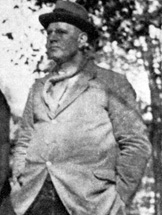The Gurdjieff Legacy Foundation Archives
Frank Pinder (1882–1962)

Francis William Stanley Pinder was born in 1882.1 Little is known of his childhood and early life. He served as a major in the British Intelligence and in 1919 while in Ekaterinodar he was induced by letters from A. R. Orage to employ a destitute P. D. Ouspensky to write press summaries. Pinder died in 1962.
In 1919, Pinder met Gurdjieff in the Caucasus and became his student. He was with him in Tiflis and Constantinople.2 In August 1921, when Gurdjieff left Turkey for Europe, he brought Pinder along to serve as a translator. At a talk in London on March 15, 1922, Ouspensky interrupted to say that Pinder wasn't translating properly.3 Gurdjieff responded emphatically, saying Pinder was translating for him, not Ouspensky. Pinder's own words describe the incident clearly and also give his impression of Ouspensky:
Of course Gurdjieff was difficult for an Englishman to interpret, since even the Russians followed his Russian often with difficulty; he purposely made nothing easy. Ouspensky apparently thought that he understood Gurdjieff and his inner teaching—which he did not, and Gurdjieff had to make him choose whether to stay with him and submit to the discipline, or break away. The episode was painful but according to law. Ouspensky knew the theory, better than anyone possibly—he had the knowledge, but he did not understand.4
Pinder said that he felt Ouspensky projected himself
in a role in which he saw himself as a successful religious teacher—though he may not have been conscious of this.... Ouspensky, for all his great brain, was, for what was real, unintelligent; and it was inevitable that Ouspensky should cut himself and his pupils off from Gurdjieff. It is strange that there can be talk of 'Ouspensky's Teaching,' and 'Gurdjieff-Ouspensky System': the Teaching is Gurdjieff's.5
Pinder continued:
All that Ouspensky had of value, he got from Gurdjieff, and that only with his mind. He had a perfunctory fling at the movements; and even confessed to being lazy. Gurdjieff's main quarrel with him was that he, Ouspensky, thought he knew better, and was apt to kick over the traces.... Ouspensky apparently thought that he understood Gurdjieff and his inner teachings—which he did not, and Gurdjieff had to make him choose whether to stay with him and submit to discipline, or break away.6
In October 1922, when Katherine Mansfield voiced interest in Gurdjieff's teaching, it was Pinder who Gurdjieff sent to interview her and subsequently to interpret. Mansfield described Pinder as "quite a remarkable man. . . rather like the chief mate on a cargo steamer."7
On January 4, 1924, Gurdjieff took most of his pupils to the U.S. to give public demonstrations, leaving Pinder in charge of the Prieuré.8 With Gurdjieff gone, thinking he might be a secret agent, Pinder riffled through Gurdjieff's personal papers (subsequently burnt by Gurdjieff in 1930) and quickly left, leaving everything in disarray. Pinder did not reappear in Gurdjieffian circles until 1937.9
Though he never wrote any books on the Work nor took on the role of teacher, Pinder was thought to have a deep understanding of the inner meaning of the Work. Regarding Gurdjieff and his mission, Pinder said:
Gurdjieff came to strike a big Doh, to help the up flow of the Law of Seven against the current of mechanical life. . . . Gurdjieff came to give us a New World, a new idea of God, of the purpose of life, of sex, of war. But who are 'Us'? 'Us' are those who accept him and his teaching and help to carry out this work. This world of ours cannot be saved in our measure of time. Had it been possible it would have been 'saved' long ago by prophets and teachers who have been sent. Those who look for the world to be saved by a single teacher in a given time are shirking their own responsibility. They wait in hope of a 'second coming' with no effort on their part—indulging in the disease of tomorrow.10
For another perspective on Pinder see the article "Pinder at Lunch," The Gurdjieff Journal #51. This presents an exchange between Gurdjieff and Pinder over lunch illustrating a different side of the man. Pinder's time with Gurdjieff is mentioned in the books Struggle of the Magicians by William Patrick Patterson, Journey Through This World by C. S. Nott, Gurdjieff: The Anatomy of a Myth by James Moore and The Harmonious Circle by James Webb.
Notes
1. James Moore, Gurdjieff: The Anatomy of a Myth (Rockport, MA: Element Inc., 1991), 358.
2. Pinder at Lunch," The Gurdjieff Journal #51, 14.
3. William Patrick Patterson, Struggle of the Magicians (Fairfax, CA: Arete Communications, 1996), 78.
4. C. S. Nott, Journey Through This World (NewYork: Samuel Weiser Inc, 1978), 91.
5. Patterson, 98.
6. Ibid., 92.
7. Moore, 358.
8. Ibid., 358–59.
9. Ibid., 359.
10. Patterson, 228.